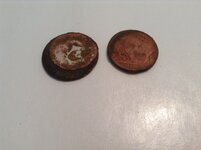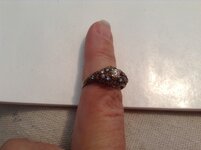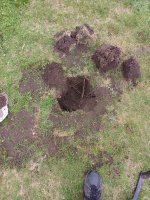baylorhall
Hero Member
- Nov 17, 2008
- 897
- 154
- 🏆 Honorable Mentions:
- 1
- Detector(s) used
- Ace 250, AT Pro
- Primary Interest:
- All Treasure Hunting
Found my first Barber quarter today! It was "glued" to a buffalo. Can't read the dates yet but they are soaking in oil. Any other cleaning suggestions?
i also dug two rings today. One is kid's silver fish ring. The other got my heart pumping! It has two markings. One says GN20. I can't read the other. Any clue what that means? Just hoping it's actually gold!
HH,
baylor
i also dug two rings today. One is kid's silver fish ring. The other got my heart pumping! It has two markings. One says GN20. I can't read the other. Any clue what that means? Just hoping it's actually gold!
HH,
baylor
Attachments
Upvote
3




 Nice finds !!
Nice finds !! 





